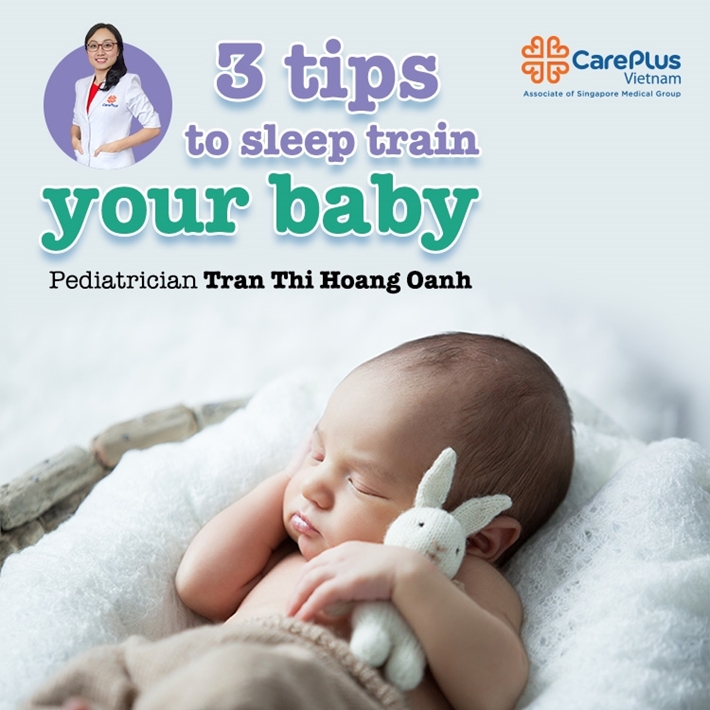3 tips to sleep train your baby
The first 3-4 months of life is the most ideal time to help your baby form a good sleep routine - when he can sleep for 6-8 hours on his own at night without crying or needing support from parents when he wakes up in the night. Here are 3 basic principles you should start doing in the first 3-4 months of life to help your baby fall asleep on his own.

8/17/2022 9:19:47 AM
Tip 1: Help your baby distinguish between day and night
Young children often cannot distinguish between day and night, so they stay awake at night and sleep during the day. Here are ways we can help your baby change to sleep better at night:
-
Keep the baby's room as dark and quiet as possible
-
Only turn on dim lights and small flashlights when you need to observe your baby at the night
-
When your baby wakes up in the night, quickly cuddle and breastfeed as soon as possible
-
Keep quiet and gentle when feeding or changing diapers, do not play or talk to your baby
-
From 3 months of age, try to keep the room quiet and darken the curtains when your baby naps during the day to make it easier for him to fall asleep
Tip 2: Put your baby to bed when he's sleepy but still awake
Try to put your baby to bed when he's drowsy but not fully asleep for the first three to four months. This helps your baby develop independent sleep associations and be able to go back to sleep when awake during the night.
If you put your baby to bed when sleepy but still awake, he'll associate the bed with sleep (but not you with rest). When your baby is older and doesn't need to be awake during the night, he won't need your help to go back to sleep when he wakes up.
If your baby often needs to be held to sleep or suckled to sleep, he will hope to be held or nursed to sleep when he wakes up and is more likely to wake as often as every 40 minutes.
If your baby frequently falls asleep in a different place and wakes up in the bed or crib, this may surprise, upset, and cry.
Tip 3: Start the cycle of eating, playing, sleeping
When your baby wakes up, start feeding, changing diapers, talking and playing with him, and coaxing him to sleep when he begins to show sleepiness.
If you can follow such a sequential process, repeating it every day, it will help your baby understand the rules and sleep better. However, for infants, it is not easy to do this rigidly. Sometimes we also need to be flexible when applying.
Some other measures
Control the time of day sleep
To make it easier for your baby to fall asleep at night, you should avoid letting it sleep for more than 4 hours a day. However, if your baby sleeps too little, he will be tired, irritable, and more challenging to sleep.
Breastfeeding and sleeping
Newborns usually feed every 2-4 hours. Babies often fall asleep more quickly when they are full. If your baby has nursed within the previous 2 hours and hasn't fallen asleep, comfort her a little before putting her to bed. If your baby still can't sleep, you can feed him a little more.
Gradual weaning of night feedings
From 6 months of age, if the baby is developing typically, night weaning can be considered. Some mothers still try to maintain breastfeeding at night even though the mother is tired because she thinks that night feeding will help her baby get enough milk and gain weight well. This is entirely unnecessary—no need to wake the baby to feed at night. Let the baby sleep well during the night, and the body rests completely. When the baby wakes up, he will be hungry and feed better.
However, if the baby still wants to breastfeed and the mother still wants to breastfeed during the night, that's okay. If you decide to continue breastfeeding during the night, try to put your baby back to bed while he is still awake, without much interaction with him, this will make it easier for him to wean off at night when the time is right.
If children often have sleep problems or parents need advice on good bedtime habits practice, register with CarePlus to get a doctor's appointment.
Visit and consult via the free hotline 18006116 or inbox Fanpage/Zalo CarePlus Clinic Vietnam or register online at the website. Download the CarePlus app for faster scheduling and more convenient calendar tracking!
CAREPLUS INTERNATIONAL CLINIC SYSTEM - Member of Singapore Medical Group
-
Branch 1: 66 - 68 Nam Ky Khoi Nghia, Nguyen Thai Binh Ward, District 1, City. Ho Chi Minh City
-
Branch 2: 2nd Floor, Crescent Plaza, 105 Ton Dat Tien, Tan Phu Ward, District 7, City. Ho Chi Minh City
-
Branch 3: 107 Tan Hai, Ward 13, Tan Binh District, City. Ho Chi Minh City